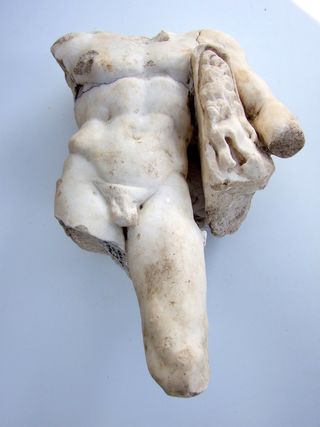Rare Headless Hercules Statue Found in Israel

A rare second-century statue of the mythic hero Hercules has been found in Israel, archaeologists reported today (Aug. 15). The buff marble masterpiece likely decorated a niche in a Roman bathhouse.
The intervening centuries have left Hercules headless, but his bulging muscles are still apparent, as is his club and the skin of the Nemean lion, which, according to myth, Hercules slew as one of his 12 labors.
According to Greek and Roman myth, Hercules was half-man, half-god, the son of the god Zeus and Alcmene, a mortal woman. Out of jealousy, Zeus' wife Hera plagued Hercules with misfortune, including a fit of madness that caused him to kill his own wife and children. In penitence, Hercules performed 12 superhuman feats, including the slaying of the vicious Nemean lion. [See an image of the statue]
Ancient artists often portrayed these tasks in murals and statuary. The newly discovered statue was found at Horvat Tabernet, in Israel's Jezreel Valley. The Israel Antiquities Authority uncovered the remains of a Roman bathhouse from the second century, along with dwellings and a well and channel that supplied water to the bathhouse's large pool. The Hercules statue was found in the pool, amidst potshards and broken glass vessels.
You can follow LiveScience senior writer Stephanie Pappas on Twitter @sipappas. Follow LiveScience for the latest in science news and discoveries on Twitter @livescience and on Facebook.
Sign up for the Live Science daily newsletter now
Get the world’s most fascinating discoveries delivered straight to your inbox.

Stephanie Pappas is a contributing writer for Live Science, covering topics ranging from geoscience to archaeology to the human brain and behavior. She was previously a senior writer for Live Science but is now a freelancer based in Denver, Colorado, and regularly contributes to Scientific American and The Monitor, the monthly magazine of the American Psychological Association. Stephanie received a bachelor's degree in psychology from the University of South Carolina and a graduate certificate in science communication from the University of California, Santa Cruz.
Most Popular


